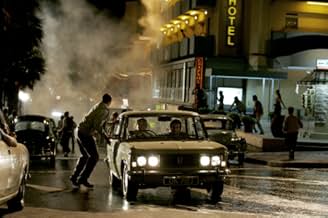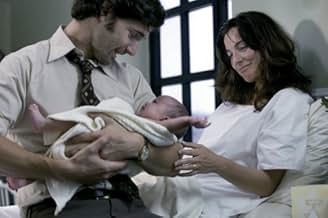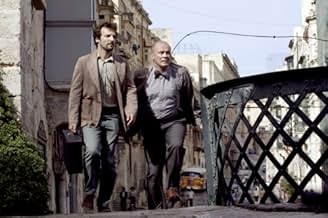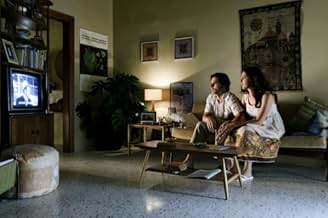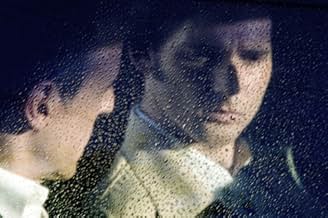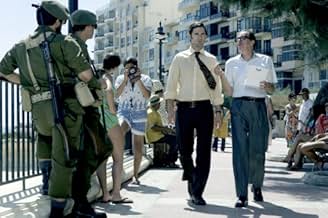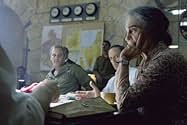Munich
Inspiré de la véritable histoire des évènements qui ont suivi la prise d'otages de Munich et des cinq hommes choisis pour assassiner les responsables de ce jour fatidique.Inspiré de la véritable histoire des évènements qui ont suivi la prise d'otages de Munich et des cinq hommes choisis pour assassiner les responsables de ce jour fatidique.Inspiré de la véritable histoire des évènements qui ont suivi la prise d'otages de Munich et des cinq hommes choisis pour assassiner les responsables de ce jour fatidique.
- Réalisation
- Scénario
- Casting principal
- Nommé pour 5 Oscars
- 14 victoires et 75 nominations au total
Marie-Josée Croze
- Jeanette the Dutch Assassin
- (as Marie-Josee Croze)
Valeria Bruni Tedeschi
- Sylvie
- (as Valéria Bruni Tedeschi)
Amos Lavi
- General Yariv
- (as Amos Lavie)
Avis à la une
Ever since he has journeyed into serious films (starting with "Empire of the Sun" and then "Schindler's List"), Steven Spielberg has been searching for a method of making violence unattractive to moviegoers. "Schindler's List" was, of course, shocking, but this first attempt at strong violence did not quite have the intended effect. I know that a lot of people (including me) feel saddened by the film, but SL's violence could seem distant at times, like the audience was merely an observer. "Saving Private Ryan" was the second great attempt at making moviegoers detest violence, but this seemed easily dismissed as a war film, showing events that would probably never happen again, like showing violence in a distant universe. Munich is his latest effort, and it shows Spielberg's feeling that his previous films, although progressive, had not quite 'hit the mark'.
The violence shown in Munich is, perhaps, the most brutal realistically intentioned violence ever shown on film. I say 'realistically intentioned' because, like the average moviegoer, I have not witnessed people getting shot or blown up, so I don't know what those events would actually look like. There are many signs in the film that Spieberg is trying to improve on his earlier efforts. The guns in the film are REALLY loud when fired. This has the effect of putting you in the fight, making it more intimate when someone IS shot. The bullet wounds and remains after explosions are quite gruesome. When someone dies in this film, no matter what side they are on, you feel no happiness, no relief or awe. You feel a sense of death, nothing dramatic, just blank and empty. For this reason, Munich is one of the most important films to have come out, and perhaps it is Spielberg's best ('Raiders' is too superhuman to be included on that list). Spielberg deserves the best director for this one.
The violence shown in Munich is, perhaps, the most brutal realistically intentioned violence ever shown on film. I say 'realistically intentioned' because, like the average moviegoer, I have not witnessed people getting shot or blown up, so I don't know what those events would actually look like. There are many signs in the film that Spieberg is trying to improve on his earlier efforts. The guns in the film are REALLY loud when fired. This has the effect of putting you in the fight, making it more intimate when someone IS shot. The bullet wounds and remains after explosions are quite gruesome. When someone dies in this film, no matter what side they are on, you feel no happiness, no relief or awe. You feel a sense of death, nothing dramatic, just blank and empty. For this reason, Munich is one of the most important films to have come out, and perhaps it is Spielberg's best ('Raiders' is too superhuman to be included on that list). Spielberg deserves the best director for this one.
Steven Spielberg has absolutely everything at his disposal, he can make an epic in no time at all. But, even he must know that films, most films have a soul and that can't be rushed. Why the need to rush this film into screens? For Oscar consideration? If there was a film that needed nurturing and thought was this one. The length is a flaw in itself. It makes it appear self indulgent and, quite frankly,annoying. If one could, and one should, put that aside, "Munich" is a remarkable experience. Tony Kushner and Eric Roth deal with people in all its complexity - a welcome new detail in a Spielberg film - and that gives "Munich" its most powerful aspect. Eric Bana is extraordinary and the humanity of his gaze is confusing and recognizable at the same time. His crying at hearing his child's voice over the phone is as real as his hardness when he massacres his targets. The controversy raising after the first public screenings seems pre-fabricated by a marketing machine. The questioning of Bana's character and the appalling nature of revenge can't be controversial it's at the base of human nature. To call Spielberg "no friend of Israel" is as absurd as it is suspicious. No, this movie is a thriller, based on actual events, directed by the greatest craftsman of the last 30 years in a record amount of time. Go see it.
Another dip in the Spielberg pool and I come away drenched in emotion. I was a freshman in high school in Texas during the Munich games. I was stunned by the events and understood little.
Today, I am still stunned by Munich and every terrorist act that followed, but I understand so much more and grieve. Spielberg gives us a powerful glimpse into the meaning of home, family, honor, history, ethics, and faith. The movie is not about the Jews and Arabs. It's about human beings. It's about us.
The narrative is driven by our connection to Avner. We watch as Eric Bana opens himself up in a way that the likes of a George Clooney in Syriana only dreams of.
This is a must see.
Today, I am still stunned by Munich and every terrorist act that followed, but I understand so much more and grieve. Spielberg gives us a powerful glimpse into the meaning of home, family, honor, history, ethics, and faith. The movie is not about the Jews and Arabs. It's about human beings. It's about us.
The narrative is driven by our connection to Avner. We watch as Eric Bana opens himself up in a way that the likes of a George Clooney in Syriana only dreams of.
This is a must see.
7e-20
Munich is a well crafted film by the biggest director on the planet. Great pacing, suspense and cinematography. The biggest problem I had with the film is that I've seen it before. A little known film called THE SWORD OF GIDEON. Munich is almost a direct copy from the original. What a shame that Spielberg has to produce a remake of a much better film. Enough already with the remakes. People want to see original stories with fresh new ideas and writers. Why are independent films so successful, because the ones that are well made and tell a good story are box office darlings. It's amazing some Hollywood films have budgets north of 100 million. Just incredible how much money and time is wasted. If you want to understand what happened in the aftermath of Munich, rent THE SWORD OF GIDDEON.
Munich may just be Spielberg's greatest accomplishment ever and it isn't a sweeping epic like you'd expect, but a patient psychological thriller that sneaks up on you and takes you and shakes you. It not shy away from blood, politics or nudity in its portrayal of events and this makes it extremely intense, absorbing and occasionally very violent.
The first half of Münich is not altogether different from a heist drama; a group of diverse men with different skills team up to accomplish a mission. They get to travel across Europe, make deals, infiltrate suspect facilities and manufacture explosive devices. Unlike heist films, however, their mission is not for personal gain, but for the government. They are to assassinate eleven Arabs who were alleged to be behind terrorist attacks like Münich 1972. So the more accessible part of the film sees Bana and his men botch their way through a hit-list as inexperienced hit-men, fumbling and trembling with the weight of this somber new task.
This part is so extraordinarily well-handled and engaging with a tone so tense and shadowed by politics and ethical dilemmas that every slight pause is mistaken for humour. It is also an excellent portrayal of an era - the 1970s - with great eye for detail, all carefully sewn together by a master tailor (Spielberg). It is a fantastic piece of film-making.
While Munich keeps you interested throughout, it gradually loses its fresh thriller edge by opting for more typical scenarios. Eric Bana's character goes through emotional struggles because he finds it too hard to kill people. He thinks about his family--his wife has just had a baby girl. He wonders if he is doing the right thing. He starts sympathizing with the Arabs. He wonders if they killings will stop once he has completed his mission. Everything is classic and you saw it coming. It needs to be present in the film for a balanced portrayal but the hackneyed formula with which it is expressed is disappointing. It started so promising, after all.
Sadly, the culmination of this slightly hackneyed recipe manifests itself in the final scene of the film and it is absolutely dreadful and drags the whole film down by at least one star - but overall this is superb quality that is carried by a strong ensemble cast (Geoffrey Rush, Daniel Craig) although it is ultimately Bana's show. He captures the inner turmoil and hesitation of his character in the most believable way, making Munich into a worthwhile adventure for its performances alone. But most importantly, it dares to asks questions.
8/10
The first half of Münich is not altogether different from a heist drama; a group of diverse men with different skills team up to accomplish a mission. They get to travel across Europe, make deals, infiltrate suspect facilities and manufacture explosive devices. Unlike heist films, however, their mission is not for personal gain, but for the government. They are to assassinate eleven Arabs who were alleged to be behind terrorist attacks like Münich 1972. So the more accessible part of the film sees Bana and his men botch their way through a hit-list as inexperienced hit-men, fumbling and trembling with the weight of this somber new task.
This part is so extraordinarily well-handled and engaging with a tone so tense and shadowed by politics and ethical dilemmas that every slight pause is mistaken for humour. It is also an excellent portrayal of an era - the 1970s - with great eye for detail, all carefully sewn together by a master tailor (Spielberg). It is a fantastic piece of film-making.
While Munich keeps you interested throughout, it gradually loses its fresh thriller edge by opting for more typical scenarios. Eric Bana's character goes through emotional struggles because he finds it too hard to kill people. He thinks about his family--his wife has just had a baby girl. He wonders if he is doing the right thing. He starts sympathizing with the Arabs. He wonders if they killings will stop once he has completed his mission. Everything is classic and you saw it coming. It needs to be present in the film for a balanced portrayal but the hackneyed formula with which it is expressed is disappointing. It started so promising, after all.
Sadly, the culmination of this slightly hackneyed recipe manifests itself in the final scene of the film and it is absolutely dreadful and drags the whole film down by at least one star - but overall this is superb quality that is carried by a strong ensemble cast (Geoffrey Rush, Daniel Craig) although it is ultimately Bana's show. He captures the inner turmoil and hesitation of his character in the most believable way, making Munich into a worthwhile adventure for its performances alone. But most importantly, it dares to asks questions.
8/10
Le saviez-vous
- AnecdotesGuri Weinberg played his own father. He is the son of Moshe Weinberg, the Israeli wrestling referee and former champion, who died in the massacre when Guri was just one month old.
- GaffesThough they took the time to digitally add the World Trade Center to the final shot, they didn't edit out the Citigroup Center, Trump World Tower, and the Bloomberg building, which were built after the time of the movie.
- Versions alternativesThe film was heavily censored in Malaysia for a 'U' rating. The uncut version is rated '18PL'.
- ConnexionsFeatured in Today: Épisode datant du 27 juillet 2005 (2005)
- Bandes originalesAin't No Sunshine
Written & Performed by Bill Withers
Courtesy of Columbia Reecords
By Arrangement with Sony BMG Music Entertainment
Meilleurs choix
Connectez-vous pour évaluer et suivre la liste de favoris afin de recevoir des recommandations personnalisées
Détails
- Date de sortie
- Pays d’origine
- Langues
- Aussi connu sous le nom de
- Untitled 1972 Munich Olympics Project
- Lieux de tournage
- Bugibba, Malte(Olympic Hotel in Cyprus)
- Sociétés de production
- Voir plus de crédits d'entreprise sur IMDbPro
Box-office
- Budget
- 70 000 000 $US (estimé)
- Montant brut aux États-Unis et au Canada
- 47 403 685 $US
- Week-end de sortie aux États-Unis et au Canada
- 4 152 260 $US
- 25 déc. 2005
- Montant brut mondial
- 130 982 407 $US
- Durée2 heures 44 minutes
- Couleur
- Mixage
- Rapport de forme
- 2.35 : 1
Contribuer à cette page
Suggérer une modification ou ajouter du contenu manquant


